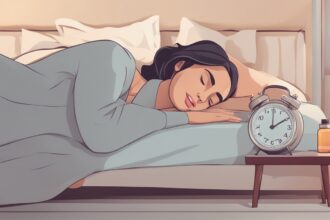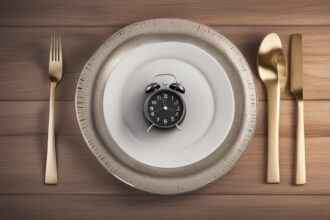Hey there, fellow health enthusiasts! If you’ve ever wondered how fasting could do more than just support weight loss or boost energy, you’re in for a treat. Today, we’re diving deep into the fascinating connection between fasting and sleep. Specifically, we’ll explore the fasting sleep benefits and how this ancient practice might be the key to unlocking deeper, more restorative rest. Whether you’re an intermittent fasting newbie or a seasoned pro, understanding how fasting impacts your sleep cycle can be a game-changer for your overall well-being. Let’s unpack the science, share some practical tips, and help you make the most of this powerful duo.
What Is Fasting, and How Does It Relate to Sleep?
Fasting, at its core, is the voluntary abstinence from food and sometimes drink for a specific period. Popular methods like intermittent fasting (IF), where you cycle between eating and fasting windows, have gained massive traction for their health benefits. But beyond shedding a few pounds or improving metabolic health, fasting has a lesser-known yet profound effect on sleep quality. Research suggests that fasting can influence hormonal balance, reduce inflammation, and even reset your body’s internal clock—factors that directly impact how well you snooze (Walker, 2017). So, if you’ve been tossing and turning at night, tweaking your eating schedule might just be the missing piece of the puzzle.
The Science Behind Fasting Sleep Benefits
Let’s get into the nitty-gritty of why fasting and sleep are such a dynamic duo. When you fast, your body undergoes several physiological changes that can enhance sleep quality. For starters, fasting promotes autophagy—a cellular cleanup process that repairs damaged cells and reduces inflammation. This process is particularly active during sleep, creating a synergistic effect that boosts recovery (Mattson et al., 2017). Additionally, fasting can regulate hormones like insulin and cortisol, which play a big role in your sleep-wake cycle. Lower insulin levels during fasting periods may help stabilize blood sugar, preventing those pesky midnight wake-ups (Spiegel et al., 2004).
Another exciting link is how fasting impacts melatonin, the hormone responsible for signaling bedtime to your brain. Some studies indicate that fasting may enhance melatonin production by aligning your eating patterns with your circadian rhythm (Peuhkuri et al., 2012). This means that adopting a consistent fasting schedule could help you fall asleep faster and enjoy deeper rest. These fasting sleep benefits aren’t just anecdotal—science is starting to back up what many fasters have felt firsthand.
How Fasting Can Improve Sleep Disorders
If you struggle with sleep disorders like insomnia or sleep apnea, fasting might offer some relief. While it’s not a cure-all, fasting’s ability to reduce inflammation and improve metabolic health can address underlying factors contributing to poor sleep. For instance, obesity is a major risk factor for sleep apnea, and fasting has been shown to support weight loss and improve respiratory function over time (Johns Hopkins Medicine, 2020). Moreover, fasting can lower stress hormones like cortisol, which often keep insomniacs awake at night (Walker, 2017). By integrating fasting into your routine, you might notice fewer restless nights and more refreshing mornings.
That said, it’s worth noting that fasting isn’t a one-size-fits-all solution. Some people may initially experience disrupted sleep as their body adjusts to a new eating pattern. The key is to start slow and listen to your body’s signals. We’ll dive into how to do this safely in the next section, but for now, know that the potential for fasting to ease sleep issues is a promising avenue worth exploring.
Practical Tips to Maximize Fasting Sleep Benefits
Now that we’ve covered the ‘why’ behind fasting and sleep, let’s talk about the ‘how.’ Implementing fasting in a way that supports better rest doesn’t have to be complicated. Here are some actionable tips to help you reap the fasting sleep benefits without feeling overwhelmed:
- Start with a gentle fasting schedule: If you’re new to fasting, try a 12:12 method (12 hours fasting, 12 hours eating) before jumping into stricter protocols like 16:8. This eases your body into the change and minimizes sleep disruptions.
- Time your eating window wisely: Aim to finish your last meal at least 2–3 hours before bedtime. Eating too close to sleep can spike insulin and disrupt your circadian rhythm (Peuhkuri et al., 2012).
- Stay hydrated during fasting: Dehydration can worsen sleep quality, so sip water throughout the day, especially during fasting windows, to keep your body happy.
- Avoid caffeine late in the day: If you’re fasting, you might be tempted to lean on coffee to curb hunger, but consuming it too late can interfere with your ability to wind down.
These small tweaks can make a big difference in how fasting impacts your sleep. Experiment with what works for you, and don’t be afraid to adjust as needed.
Common Pitfalls to Avoid When Combining Fasting and Sleep Goals
While the benefits of fasting for sleep are exciting, there are a few pitfalls to watch out for. Fasting isn’t always a smooth ride, especially when you’re aiming to improve rest. Here are some common mistakes and how to sidestep them:
- Overdoing fasting too soon: Diving into prolonged fasts without preparation can lead to hunger pangs or low energy, which might keep you up at night. Build up gradually.
- Ignoring nutrient balance: Even during eating windows, prioritize nutrient-dense foods. Skimping on essential vitamins like magnesium or B vitamins can negatively affect sleep quality (Grandner et al., 2014).
- Fasting too late in the day: If your fasting window extends too close to bedtime, you might feel overly hungry or irritable, making it harder to relax.
By being mindful of these hurdles, you can ensure that your fasting journey supports rather than sabotages your sleep goals. Remember, consistency and balance are key when chasing those fasting sleep benefits.
Who Should Be Cautious with Fasting for Sleep Improvement?
While fasting offers incredible potential for better sleep, it’s not for everyone. Certain groups should approach fasting with caution or consult a healthcare provider before starting. If you have a history of eating disorders, fasting might trigger unhealthy patterns and should be avoided. Pregnant or breastfeeding individuals also need consistent nutrition, so fasting may not be suitable. Additionally, those with medical conditions like diabetes or low blood sugar should monitor their health closely, as fasting can affect blood glucose levels and, in turn, sleep stability (Mattson et al., 2017).
If you’re on medication or have chronic sleep disorders, speak with a doctor or nutritionist to tailor a fasting plan that won’t interfere with your health. The goal is to enhance your rest, not add stress to your life. Personalizing your approach to fasting ensures you get the benefits without the risks.
As we wrap up, it’s clear that the connection between fasting and sleep is more than just a passing trend—it’s a powerful tool for optimizing health. The fasting sleep benefits range from hormonal balance to improved circadian rhythm, offering a natural way to combat restless nights. By starting with a manageable fasting schedule, timing your meals strategically, and avoiding common pitfalls, you can transform your sleep quality while reaping the broader perks of fasting. Remember, everyone’s body is different, so take it slow, listen to your needs, and consult a professional if you’re unsure. Here’s to better rest and brighter mornings—let’s make fasting and sleep work hand in hand for a healthier you!
References
- Grandner, M. A., Jackson, N., Gerstner, J. R., & Knutson, K. L. (2014). Dietary nutrients associated with short and long sleep duration. Data from a nationally representative sample. Appetite, 78, 71–80.
- Johns Hopkins Medicine. (2020). The link between obesity and sleep apnea. Retrieved from Johns Hopkins Medicine website.
- Mattson, M. P., Longo, V. D., & Harvie, M. (2017). Impact of intermittent fasting on health and disease processes. Ageing Research Reviews, 39, 46–58.
- Peuhkuri, K., Sihvola, N., & Korpela, R. (2012). Diet promotes sleep duration and quality. Nutrition Research, 32(5), 309–319.
- Spiegel, K., Leproult, R., & Van Cauter, E. (2004). Impact of sleep debt on metabolic and endocrine function. The Lancet, 354(9188), 1435–1439.
- Walker, M. P. (2017). Why we sleep: Unlocking the power of sleep and dreams. Scribner.






